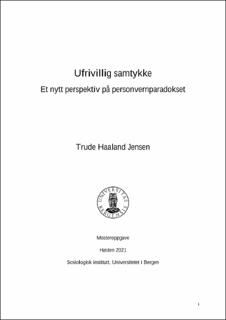Ufrivillig samtykke: Et nytt perspektiv på personvernparadokset
Master thesis
Permanent lenke
https://hdl.handle.net/11250/2772341Utgivelsesdato
2021-08-05Metadata
Vis full innførselSamlinger
- Master theses [81]
Sammendrag
Digital innsamling av persondata er noe som angår oss hele tiden. Hverdagslige handlinger legger igjen digitale fotspor og for de største teknologiselskapene blir persondata regnet som svært verdifullt. Menneskers digitale aktivitet har utviklet seg til å bli en milliardindustri. Forskning på personvern og digital adferd viser at de fleste mennesker uttrykker bekymring knyttet til innhenting og bruk av personlig informasjon, samtidig som de er villig til å gi fra seg store mengder data for å få tilgang til en tjeneste. I forskningslitteraturen har det blitt registrert som et paradoks at det ikke er samsvar mellom digital personvernholdning og digital personvernhandling. Det er uenighet innen forskningsmiljøet om paradoksets eksistens, hvor noen undersøkelser hevder at adferden stemmer overens med holdningene. Med utgangspunkt i tidligere forskning gjennomfører jeg en dypere analyse av personvernparadokset. Forskningsspørsmålene mine er: 1. Eksisterer personvernparadokset eller kan det forstås på en annen måte? 2. Hvordan beskrives fenomenet? For å belyse problemstillingene har jeg kombinert to ulike metoder og utfører en survey undersøkelse med panelstruktur og fire fokusgruppeintervjuer. Slik kan jeg empirisk utforske forholdet mellom oppfatninger og holdninger samtidig som jeg går dypere inn i paradoksets kompleksiteter og nyanser. Jeg finner noe som ligner et paradoks både i de kvantitative og de kvalitative dataene, men hevder i lys av de kvalitative dataene at forståelsen av paradokset må nyanseres. Jeg trekker i all hovedsak på teorier og begreper av Anthony Giddens og Ulrich Beck, hvor den teoretiske rammen baserer seg på hvordan risikosamfunnet har skapt nye konfliktdimensjoner og økende usikkerhet. Jeg forsøker også å knytte motivene bak utviklingen av overvåkingssamfunnet opp mot endrede samfunnsstrukturer for å forstå hvordan individet blir fratatt selvbestemmelse, og hva som skjer når det sosiale systemer radikaliseres i det digitale. Våre digitale vaner viser seg å være skjøre og utilstrekkelige og reflekterer modernitetens ustabilitet. Digital collection of personal data is something that concerns us all the time. Everyday actions leave digital footprints and for the largest technology companies personal data is considered very valuable. People's digital activity has developed into a billion-dollar industry. Research on privacy and digital behavior shows that most people express concern about the collection and use of personal information, while also being willing to give away large amounts of data to access a service. In relevant research literature, it has been registered as a paradox that there is no correlation between digital privacy attitudes and digital privacy actions. There is disagreement within the research community about the existence of the paradox, where some studies claim that digital behavior is in line with digital attitudes. Based on previous research, I carry out a deeper analysis of the privacy paradox. My research questions are: 1. Does the privacy paradox exist or can it be understood in different way? 2. How is the phenomenon described? To shed light on the issues, I have combined two different methods and conducted a survey with a panel structure and four focus group interviews. In this way I can empirically explore the relationship between perceptions and attitudes at the same time as I go deeper into the complexities and nuances of the paradox. I find something similar to a paradox in both the quantitative and the qualitative data, but argue in the light of the qualitative data that the understanding of the paradox must be nuanced. I draw mainly on the theories and concepts of Anthony Giddens and Ulrich Beck, where the theoretical framework is based on how the risk society has created new conflict dimensions and increasing uncertainty. I also try to link the motives behind the development of the surveillance society to changing social structures to understand how the individual is deprived of self-determination, and what happens when the social systems are radicalized in the digital. Our digital habits are proving to be fragile and inadequate, reflecting the instability of modernity.
